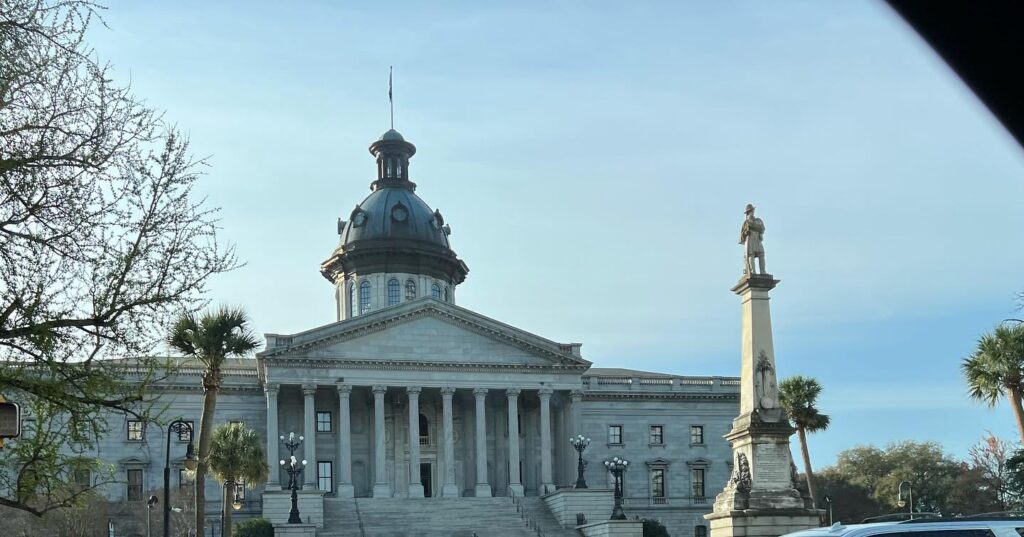Delivered on August 17, 2022 to SC Senate Medical Affairs Committee
Good morning! I am the Reverend Merianna Harrelson. I am the Pastor of Garden of Grace United Church of Christ on Atlas Road in Southeast Columbia. I appreciate the opportunity to speak with you all this morning on this crucial issue involving my own ministry and your roles as legislators. As representatives of the people, taking time to listen is essential in understanding the people you serve. Listening asks us to have compassion for someone else as well as asks us to stop and reflect on the way our decisions impact other people as we live and serve together.
Thomas Jefferson, our founding father, notes in the Virginia Statue on Religious Freedom that the important of legislators should not presume to assumed authority over the moral reasoning or faith of those they represent saying they shall not “extend it by its influence on reason alone; that the impious presumption of legislators and rulers, civil as well as ecclesiastical, who, being themselves but fallible and uninspired men, have assumed dominion over the faith of others, setting up their own opinions and modes of thinking as the only true and infallible, and as such endeavoring to impose them on others, hath established and maintained false religions over the greatest part of the world and through all time.” Jefferson recognized, even at the inception of our democracy, the importance of keeping moral decisions in the realm of the church and clergy and out of the hands of legisltators. His vision was one where we could work together to provide support for people without dictating our moral codes over other people. It is of paramount important that we recognize our respective role sin determining morality and “right” vs. “wrong” as well as recognize that we are not perfect people.
Jefferson continues to warn against the intertwinement of church and state explaining that if legislators govern by their religious beliefs it serves to dilute the power of the government as well as the power of their religious beliefs: “it tends also [only] to corrupt the principles of that very religion it is meant to encourage, by bribing, with a monopoly of worldly honours and emoluments, those who will externally profess and conform to it.” By governing based on one religious belief, we actually make that religious belief weaker.
As a member of the clergy, it is my great privilege to stand with people in the greatest joys of their lives and in their deepest sorrows. I am often called upon to counsel families as they celebrate new beginnings as well as be there as they consider when and how to help their loved ones transiton beyond this life. These questions of life and death are questions we all must face because we are ash and to ash we shall return. As we wrestle with these questions, having someone be a peaceful presence and a moral guide is in incredible responsibility that falls on the shoulders of clergy, not legislators.
My ability to be a peaceful presence and moral guide is impeded when legislation overreaches into the personal lives and personal autonomy of indidivudals, especially birthing bodies who have the ability to carry life within them. This is not the vision of our founding fathers nor does it provide the support birthing bodies’ need as they confront the sacred ability to bring new life into this world.
We know that the 61% of the population supports those with birthing bodies being able to make decisions under the advisement of medical professionals, chaplains, and members of the clergy about their own bodies and the sacred task of being able to bring new life into the world. As representatives who are elected by the people and for the people, legisltating against the majority of the people is allowing doctrine and political agenda to rule rather than the will of the the people.
In the gospel of Matthew, Jesus is asked what the greatest commandment is and he answers “to love the Lord your God with all your heart soul and mind and the second is like it to love your neighbor as yourself.” As people of faith we are guided by love understanding that our decisions impact our neighbors and that we don’t live isolated lives. It is not love to legislate about women’s bodies. It is not love to limit women’s abilities to access healthcare. It is not love to use positions of power given to us by our neighbors to benefit some and not all.
In South Carolina, we are known as consistently ranking in the top top states for the highest rate of domestic violence against women. In a recent report in The State newspaper, South Carolina was noted as one of the most dangerous states for women ranking number 46 out of 50. Restrictive legislation about birthing bodies’ ability to seek care and counsel for themselves will only serve to confirm that this is not the state to raise daughters. Is that what we want our state to be known for?
Just as I have to ask myself how best I can provide support to those I serve, so, too, must you ask yourselves the same question, “How can I best support the people I serve?” This is not a question of what can I use my power to accomplish, but how can I serve the women of South Carolina.

